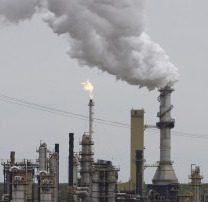EU agrees climate pledge that may boost Copenhagen
 EU leaders have agreed to pay 7.2bn euros (£6.5bn; $10.6bn) over the next three years to help developing nations adapt to climate change.
EU leaders have agreed to pay 7.2bn euros (£6.5bn; $10.6bn) over the next three years to help developing nations adapt to climate change. Announcing the deal, Swedish Prime Minister Fredrik Reinfeldt said all 27 EU member nations would contribute and that the EU was doing its “fair share”.
UK Prime Minister Gordon Brown said the UK’s promise, at £500m ($800m; 553m euros) a year was the highest.
EU leaders hope the deal may boost the current UN climate talks in Copenhagen.
“What we are seeing today is a very significant move forward in the search for a Copenhagen agreement,” said Mr Brown.
Speaking at the end of the two-day EU summit in Brussels, European Commission President Jose Manuel Barroso said he was confident the agreement could kick-start the final negotiations in Denmark.
But BBC environment correspondent Richard Black says that although EU leaders believe they have a credible finance proposal, it is by no means certain that all developing countries will see it as enough, even if the EU figures are matched by countries such as Japan and the US.
“I believe that when the final figures are made available, France and Germany will also be putting up very substantial sums” - UK Prime Minister Gordon Brown.
Particularly among some of the poorer African countries, there are demands for a lot more money considerably sooner, our correspondent says, and whether they accept these figures will depend on what else is on the table in Copenhagen.
The money pledged is for a “fast start” fund to help the world’s poorest nations tackle rising sea levels, deforestation, water shortages and other consequences of climate change between 2010 and 2012, and reduce their own emissions.
The promised EU contribution will make up a sizeable portion of a proposed global figure of $10bn (7bn euros) annually.
Reports from Brussels suggest the German contribution will be 480m euros a year from 2010 to 2012.
Earlier, Mr Brown and France’s President Nicolas Sarkozy told a joint news conference their two nations would contribute at least £1.5bn (1.7bn euros; $2.4bn) spread over the three years.
They also said the EU should commit to cut emissions by 30% on 1990 levels by 2020.
“The Copenhagen deal must be consistent with a maximum global warming of 2C,” Mr Brown said.
Mr Brown said about 20% of the fast start finance must go towards forest protection. He said the EU was seeking a 25% global reduction in deforestation by 2015.
Mr Sarkozy said France and Britain had decided to co-ordinate all their efforts to achieve “a genuine axis” between Europe and Africa, in order to get the most ambitious agreement possible in Copenhagen.
However, some campaign groups have questioned whether the funds promised will be “new” money.
“Almost all of the money is likely to be simply a relabelling of existing aid commitments,” said Anne-Catherine Claude, of ActionAid.
“Many EU members have a track record of repackaging or re-announcing existing aid commitments. This appears to be the case here too,” she added.
Bruno Tseliso Sekoli, chairman of the Least Developed Countries bloc, told the BBC that the money being pledged was not enough.
“Any money that would flow from the developed to developing worlds would be welcome but these numbers are very, very low,” he said.
Meanwhile, the draft text of a possible final deal at the Copenhagen summit urges rich countries to raise their pledges on cutting greenhouse gas emissions.
In the past, EU leaders have pledged a 20% reduction, with an option to cut to 30% if other parts of the world agree to make the same kind of contribution.
In the US on Thursday, a bipartisan Senate group proposed the framework for a new climate bill that suggests cutting carbon emissions by 17% by 2020 from 2005 levels.
The senators hope the framework will form a compromise and be in line with a bill that narrowly passed the House of Representatives in June.
‘Tobin Tax’ call
Financial matters were also being discussed at the twice-yearly summit in Brussels.
EU leaders have urged the International Monetary Fund (IMF) to consider implementing a global tax on financial transactions, as they seek to ensure that banks do not take excessive risks that could lead to another financial crisis.
“The European Council encourages the IMF to consider the full range of options including insurance fees, resolution funds, contingent capital arrangements and a global financial transaction levy in its review,” the summit’s final statement said.
A so-called “Tobin Tax” has been pushed by France and the UK, but is less popular in the US.
The European Council meeting was the first since the Lisbon Treaty came into effect and Belgium’s Herman van Rompuy was elected as its first president.
BBC News.
You can return to the main Market News page, or press the Back button on your browser.

